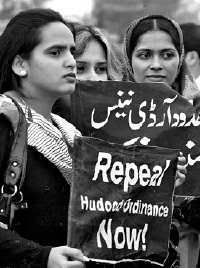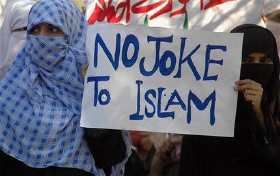 Women Protection Bill, 2006 (“WPB”) has finally passed, in an overwhelming majority vote, by the Pakistani Senate. MMA in a last attempt to make WPB ineffective suggested 17 amendments, which were all rejected by the Senators. Having already been cleared by the National Assembly, the only thing left, procedurally, for the bill to become law of the land is Presidential consent.
Women Protection Bill, 2006 (“WPB”) has finally passed, in an overwhelming majority vote, by the Pakistani Senate. MMA in a last attempt to make WPB ineffective suggested 17 amendments, which were all rejected by the Senators. Having already been cleared by the National Assembly, the only thing left, procedurally, for the bill to become law of the land is Presidential consent.
WPB is the first step towards changing the draconian rape and adultery laws, which were implemented by the President Zia-ul-Haq. The present Musharraf government has fought very hard to get these changes through and to make these amendments possible. This is not to suggest that these amendments are in anyway adequate or enough, however, they are the first step. WPB has been severely compromised by the pressure from MMA. They were some changes suggested by them, which have been incorporated in the Bil (text of changes available courtesy of eteraz.org). However, the entire text of the Bill still remains unavailable; therefore, it is very difficult to comment on the same with any certainty.
Ali Eteraz does offer some analysis on WPB and the issues with the same:
“Rape is now tried under the secular penal code, and the Sharia courts do not have jurisdiction over rape/rape-allegations.
This means that rape does not have to be proven by four witnesses (it can now be proven by circumstantial, even DNA evidence). The part on rape is the biggest victory of this bill. Rape has been totally separated from adultery or any other crimes of chastity.
Non-rape extra-and-pre-marital sex acts are still tried by the Sharia courts.
However, “lewdness” (a new offense which includes both adultery and pre-marital sex) will be tried by the secular courts.Yes, that means that two different court systems will have power over adultery and pre-marital sex: adultery/fornication matrix for Shariah courts; lewdness matrix for secular courts.
Those two courts systems will fight over it, and I have no idea how they determine who gets to try them. That is actually the million dollar question. My lawyer friend suggests that it is a judge which determines the jurisdiction. Question is: is that a Sharia judge or a secular judge?�
 The analysis further suggests that the matter would fall within the jurisdiction of Shariah court because of the Article 203D and 203DD (which describes the power of Shariah Court). This may not be necessarily true, and these questions of procedural and interpretation of law would only become clear with the passage of time and development of case law under the amended law.
The analysis further suggests that the matter would fall within the jurisdiction of Shariah court because of the Article 203D and 203DD (which describes the power of Shariah Court). This may not be necessarily true, and these questions of procedural and interpretation of law would only become clear with the passage of time and development of case law under the amended law.
However, it needs to be noted that most of the analysis is based on hearsay and is based on assertions and presumptions from other sources. Nonetheless, the analysis offered does deal with some of the legal and constitutional issues that may/will arise in respect of WPB. The limited text, which is available on Eteraz and the commentary in the newspapers all suggests that even at its best WPB, is extremely vague and there are various ambiguities and loopholes in the same. Any detailed and concrete analysis of legal issues would have to wait until the availability of the draft legislation.
 Nevertheless, it would not be wrong to say that the Presidential consent would not be the end of WPB both politically and legally. Politically there is the dilemma of threat by MMA of resigning from the National Assembly. Legally there are issues of constitutional law as well as procedural law attached with this legislation. In context of legal issues, this matter will only be conclusively decided either by the decision of the Supreme Court of Pakistan or by further amendments to the legislation.
Nevertheless, it would not be wrong to say that the Presidential consent would not be the end of WPB both politically and legally. Politically there is the dilemma of threat by MMA of resigning from the National Assembly. Legally there are issues of constitutional law as well as procedural law attached with this legislation. In context of legal issues, this matter will only be conclusively decided either by the decision of the Supreme Court of Pakistan or by further amendments to the legislation.
Umera Ali is a lawyer and blogs at Pointless Conundrum.




















































sure Umera, I was always a neutral soul for any matter. I would love ti have a copy of new bill. If you can arrange by yor sources then do make a pdf copy and upload it.
There is no displeasure, it just I am not being a victom of media propaganda like others and you. What’s wrong in it? When I can read both parties old law authors and new law authors then why should one ask to believe me on new bill just because it was proposed by another dictator. I think Old law author has removed my confusion about 4 evidence issues. The oponent party can also convince me[us] that why new law is good and old was bad. So far noone including columnists like Ayaz amir were able to comeup with concrete statments rather they re bullying and cursing Mullahs without any solid proof. This is really a shame for a person like Ayaz Amir who has a good reputation among dawn readers.
I have no idea why MMA is not filing constitutional petition, but it can easily be filed based on alleged infringement of Article 227 read with Article 2A of the Constitution. I cannot preempt the decision of Supreme Court. You may be absolutely right and the petition might be dismissed by the Supreme Court. However, you maybe completely wrong and the petition might be successful. Any opinion on the issue, can only be formed once the draft legislation is available. I cannot be expected to speculate on the decision of Supreme Court and make those speculation part of my analysis, when I haven’t even read the entire draft legislation.
How can you expect me or any lawyer for that matter to make analysis of intercities of law, based on hearsay? The analysis in the post only deals with the jurisdictional change of the crimes of rape and adultery, and secondly it deals with the issue of parallel crimes of adultery under hudood ordinance and penal code and the ambiguity in law in that respect. Any analysis, which goes beyond this without reading of the text, would be complete speculation because no one can be expected to quote the correct words of legislation, which are essential to interpretation of law, both substantial and procedural, and are mandatory for detail legal analysis.
All I can say, it must be result of my legal training that I am so conservative in offering legal opinion on the intercities of law, without reading the law. However, the draft legislation does change both these crimes conceptually and it is that change, which forms the core of the analysis in the post. However, once the legislation is available, I would be more than happy to do a detailed legal analysis, which deals both with substantial and procedural implications of this law.
No no I dont agree that the bill is open to a constitutional challenge — that can only happen if a petition is filed in the Supreme Court on such grounds and I am pretty sure nothing will come of that even if a petition is filed — besides why doesnt the MMA file such a petition —
Also, I havent seen the bill myself but if you read news reports of the day it was passed all these details were there — tho second-hand, this info is pretty credible because it comes from members of parliament and government officials who have obviously seen the bill — the resignations (IF THEY HAPPEN) may or may not create complications — the govt has already said that they will hold bye elections immediately — that has nothing to do with the bill’s passage because that has already taken place
Omar,
I have said that I have not seen the entire bill and I have only seen the amendments suggested by the ulema committee, which were included in the bill. As a matter of fact one thing I have very clearly said is that the analysis offered is based on lot of hearsay that any concrete and detailed analysis would have to wait availability of the draft legislation. It is to that affect, that in one of my comments, I had requested a copy of the draft legislation if any one could provide me with the same.
You are right, President has to sign the bill and that is what I have said in my post. We agree. The bill is open to constitutional challenge and that is a reality. We agree. Politically, I am not sure what you mean – will MMA resigning not create political difficulties in the country? I think that is a question of moot. However, if the suggestion is resigning will not make any difference to passing of the law, then you are right it wouldn’t because it has already been passed by both the houses and now only requires Presidential consent, but I have not suggested otherwise. I think we agree here as well.
Samadani,
One of the biggest problem legally with the Hudood (Enforcement of zina), 1979 was failure to prove rape resulted in accusation/conviction for zina. However, as far as I can tell now the law of rape and zina have been separated and failure to prove rape cannot result in accusation/conviction for rape. This is incidentally classical Islamic law position. Therefore, the things are good in that sense and better than under the Hudood Ordinance. However, as I said in my post rest is difficult to determine at this stage.
Daktar,
You are right, the achievement is definitely bigger in terms of politics than law.
Adnan,
I would like to help you, except, I have no clue what is it the reason for your displeasure and discontentment in this case.